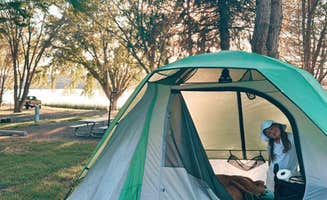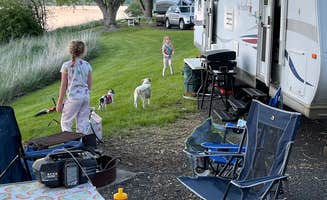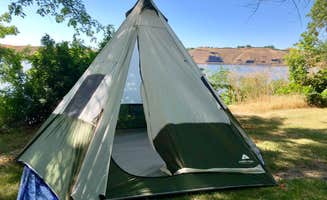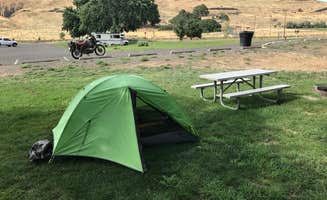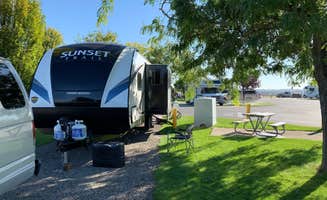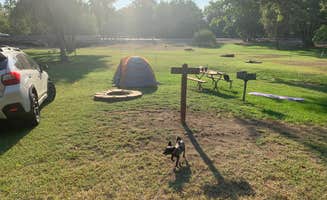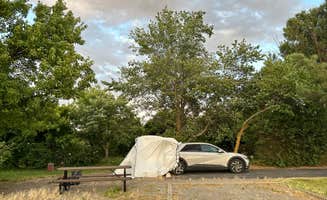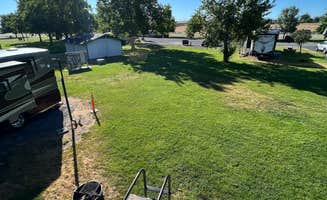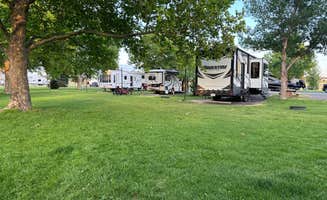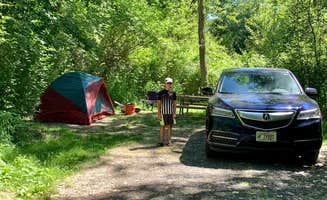Lake Sacajawea spans approximately 9,200 acres along the Snake River in eastern Washington, with water levels fluctuating throughout the year due to dam operations. Most camping areas sit at elevations between 400-500 feet with minimal tree cover, creating exposure to high summer temperatures that regularly exceed 90°F. The surrounding terrain transitions from irrigated agricultural land to shrub-steppe desert ecology with native grasses, sagebrush and occasional juniper stands.
What to do
Swimming at designated beaches: Hood Park offers a dedicated swimming area with relatively shallow entry points suitable for children. One visitor noted, "There is a connected park that is only open during the day with a beach" where families can enjoy supervised swimming with restroom facilities nearby.
Fishing from shore: Fishhook Park provides excellent bank fishing opportunities with catch reports for catfish, bass and walleye. A camper confirmed, "The catfish were biting!" while others mention convenient dock access that eliminates the need for a boat to enjoy fishing.
Water sports: Charbonneau Park accommodates various watercraft with its boat launch and dock. As one visitor described, "They have a boat launch as well as a separate dock for picking up passengers," making it convenient for wakeboarding and other activities, though "weekends are pretty wild with the wake boarders but week days are mellow."
Wildlife viewing: Juniper Sand Dunes OHV offers desert habitat viewing opportunities with night sky observation. A visitor recommends: "Beautiful place to see the stars. Track your hikes, as it's easy to lose your way!" The open landscape provides unobstructed views for stargazing away from city lights.
What campers like
Spacious campsites: Many Lake Sacajawea campsites feature generous spacing between units, especially at Fishhook Park where one reviewer highlighted, "RV sites have a crazy amount of space between them - so awesome to not have to look into your neighbors RV."
Well-maintained facilities: Hood Park receives consistent praise for its upkeep. A camper described it as having "tons of wide green lawns with lots of space, camp sites end up pretty well spaced apart so you might only have 2 or 3 neighbors then a ton of lawn before another neighbor."
Direct water access: Shoreline proximity remains a major draw, with Fishhook Park offering convenient water entry points. One visitor explained their experience: "We had a short walk to the shore with our paddle boards and a great day on the river," highlighting the ease of enjoying water recreation without long hikes to the lake.
Family amenities: Playgrounds and organized activities enhance the camping experience for families. Hood Park offers "a playground and interpretive events for kids in the evenings. They even had some movies on the weekends," according to a visitor who appreciated these structured activities.
What you should know
Reservation requirements: Most Lake Sacajawea campsites must be reserved through Recreation.gov, even for last-minute arrivals. A Charbonneau Park camper advised: "It's a nice clean park. Make reservations on Recreation.gov first. Even if you are showing up at 7:30 at night."
Hookup limitations: Water connections vary by campground and site, with some offering only electrical. At COE Lake Sacajawea Charbonneau Park, a visitor reported: "Had a nice pull thru site, only electrical (30/50) hook ups, no water or sewer."
Night lighting issues: Some campgrounds have security lighting that may affect sleep quality. One Charbonneau Park camper noted: "Stayed in site 54 and a very bright street light shown through our blinds all night."
Train noise disruptions: Railroad tracks near several campgrounds create noise issues. At Fishhook Park, a camper warned: "It is also right off of the train tracks and the train runs numerous times a day and early in the morning."
Wildlife concerns: Certain areas have rattlesnake populations. A Fishhook Park visitor cautioned: "There's a trail to the lake but we were warned not to use it due to the high likely hood of encountering rattlesnakes."
Tips for camping with families
Swimming areas with gradual entry: Select sites near designated swimming beaches for safer water access. At Hood Park, there's "a connected park that is only open during the day with a beach" providing monitored swimming areas ideal for children.
Playground access: Pasco Tri-Cities KOA offers developed play facilities. One family noted, "Nice playground and RC track which our child loved," providing entertainment options when not at the lake.
Insect preparation: Pack insect repellent for mosquitoes, particularly during evening hours. A Hood Park visitor mentioned: "Mosquitoes were present but our device kept them away," suggesting portable mosquito repellent devices work effectively in this area.
Irrigation sprinkler awareness: Some campgrounds use overnight irrigation systems. One Hood Park camper shared: "The only issue we have is the sprinklers come on Friday nights and wash the tents for us. It's good and bad."
Tips from RVers
Limited shade considerations: Prepare for direct sun exposure at many sites. A Fishhook Park RVer noted: "Site 27 was in the direct sunlight, no shade, all day. Also had strong side winds coming off of the lake," suggesting awnings and shade structures are essential during summer months.
Dump station locations: Plan waste management accordingly as sewer hookups are limited. At Hood Park, "Water is nearby. Restroom was just OK. Water tank can be filled at park at dump station," requiring planning for longer stays.
Level site selection: Most sites are reasonably level but some require minimal adjustment. At Fishhook Park, "The back-in sites are wide enough to comfortably fit a TT, 5th wheel or RV and your toad or other vehicle side-by-side. The pull-through sites are very large. All sites have gravel camper pads and most appeared very level or had a level area."
Heat management: Summer temperatures regularly exceed 90°F with minimal natural shade. An RVer at Franklin County RV Park advised: "Inexpensive RV park in Pasco. Other options were full or twice the rate," offering a budget-friendly alternative with hookups for air conditioning during hot weather.


